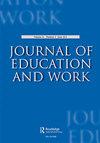The quality of a professional portfolio career in the post-industrial era
IF 1.7
Q2 EDUCATION & EDUCATIONAL RESEARCH
引用次数: 1
Abstract
ABSTRACT Post-industrial society has witnessed trends according to which the labour market has become more flexible, services have expanded and immaterial work and horizontal work organisation has emerged, shaping professions in respect to the employment and work they can offer. An outcome of these trends is a portfolio career, an employment pattern based on holding down multiple jobs, which increases the variation in the quality of career trajectories. Portfolio careers, however, are shaped at the intersection of industry and profession. This article studies the quality of a professional portfolio career by investigating the employment pattern and the task profile. Two case studies, one involving business consulting professionals and the other professionals in the creative industry, are investigated. The study is based on the analysis of interview data. For both professional groups, the quality of employment was impaired by the insecurity inherent in a portfolio career, but the quality of the professional profile of tasks was relatively adequate. For the consulting professionals studied, the quality of the task profile is due to the coherent but multidisciplinary continuum of tasks, which in turn is due to the market-based service industry. For the professionals in the creative industry, the profile consisted of professional tasks and tasks external to the profession, which is due to underemployment in the industry.后工业时代职业组合的质量
后工业社会见证了劳动力市场变得更加灵活的趋势,服务已经扩大,非物质工作和横向工作组织已经出现,形成了他们可以提供的就业和工作方面的职业。这些趋势的一个结果是组合型职业,一种以从事多份工作为基础的就业模式,这增加了职业轨迹质量的变化。然而,组合型职业是在行业和专业的交叉点形成的。本文通过考察职业组合职业的就业模式和任务概况,对职业组合职业的质量进行了研究。调查了两个案例研究,一个涉及商业咨询专业人员,另一个涉及创意产业的专业人员。本研究基于对访谈数据的分析。对于这两个专业群体来说,由于组合职业所固有的不安全感,就业的质量受到损害,但是任务的专业概况的质量相对来说是足够的。对于所研究的咨询专业人员来说,任务概况的质量是由于连贯但多学科的任务连续体,这反过来又是由于以市场为基础的服务行业。对于创意产业的专业人士来说,简介包括专业任务和专业之外的任务,这是由于该行业的就业不足。
本文章由计算机程序翻译,如有差异,请以英文原文为准。
求助全文
约1分钟内获得全文
求助全文
来源期刊

Journal of Education and Work
EDUCATION & EDUCATIONAL RESEARCH-
CiteScore
2.70
自引率
14.30%
发文量
40
期刊介绍:
The Journal of Education and Work is an international forum for academic research and policy analysis which focuses on the interplay of the education and economic systems. The journal examines how knowledge, skills, values and attitudes both about and for work and employment are developed within the education system. The journal also explores the various forms of industrial training and accreditation in the economic system, including changes in the economic and industrial infrastructure which influence the type of employees required. Work in the informal economy is also included.
 求助内容:
求助内容: 应助结果提醒方式:
应助结果提醒方式:


